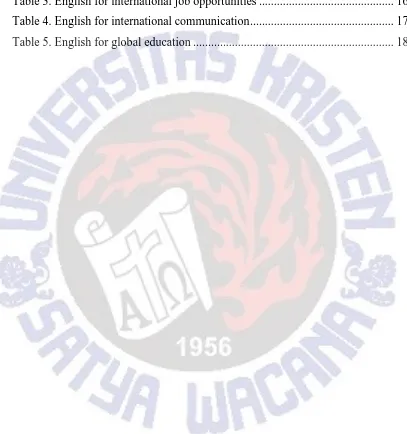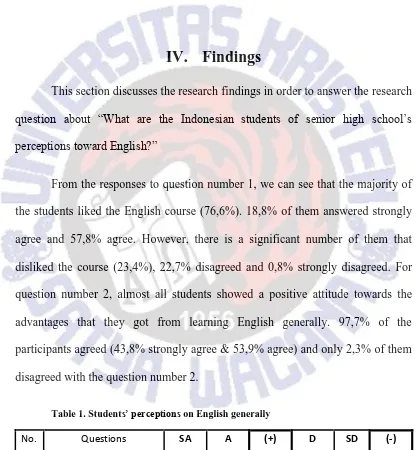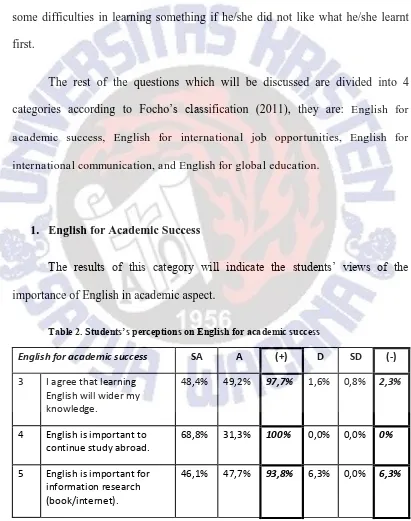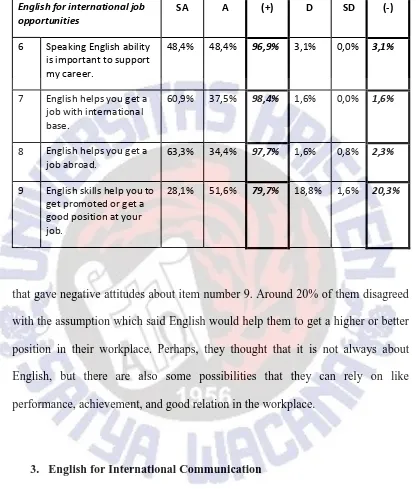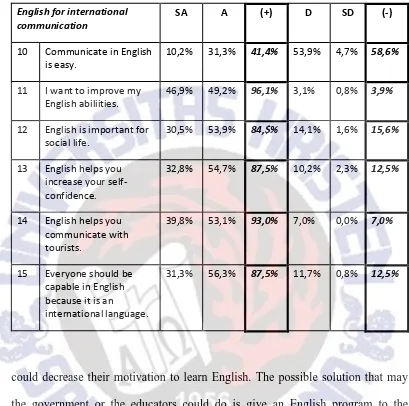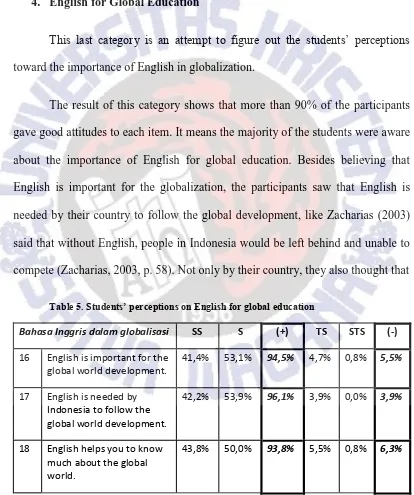An Analysis of
Students’ Perceptions toward
the Role of English:
The Case of Students of SMA Kristen 1 & SMA Theresiana
Salatiga
THESIS
Submitted in Partial Fulfillment of the Requirements for the Degree of
Sarjana Pendidikan
Immanuel Raymond Arthur Mailuhu 112010134
ENGLISH LANGUAGE EDUCATION PROGRAM FACULTY OF LANGUAGE AND LITERATURE
SATYA WACANA CHRISTIAN UNIVERSITY SALATIGA
i
An Analysis of
Students’ Perceptions toward
the Role of English:
The Case of Students of SMA Kristen 1 & SMA Theresiana
Salatiga
THESIS
Submitted in Partial Fulfillment of the Requirements for the Degree of
Sarjana Pendidikan
Immanuel Raymond Arthur Mailuhu 112010134
ENGLISH LANGUAGE EDUCATION PROGRAM FACULTY OF LANGUAGE AND LITERATURE
SATYA WACANA CHRISTIAN UNIVERSITY SALATIGA
ii
An Analysis of
Students’ Perceptions toward
the Role of English:
The Case of Students of SMA Kristen 1 & SMA Theresiana
Salatiga
THESIS
Submitted in Partial Fulfillment of the Requirements for the Degree of
Sarjana Pendidikan
Immanuel Raymond Arthur Mailuhu 112010134
Approved by:
E. Titik M., M.TransStud., PhD Athriana Santye Pattiwael, M.Hum.
iii
COPYRIGHT STATEMENT
This thesis contains no such material as has been submitted for examination in any course or accepted for the fulfillment of any degree or diploma in any university. To the best my knowledge and my belief, this contains no material previously published or written by any other person expect where due references is made in the text.
Copyright@2016. Immanuel Raymond Arthur Mailuhu and Elisabet Titik Murtisari
All right reserved. No part of this thesis may be produced by any means without permission of at least one of the copyright owner or the English Department, Faculty of Language and Literature, Satya Wacana Christian University, Salatiga
iv
PUBLICATION AGREEMENT DECLARATION
As a member of the (SWCU) Satya Wacana Christian University academic community, I verify that:
Name : Immanuel Raymond Arthur Mailuhu
Student ID Number : 1120110134
Study Program : Language and Literature Kind of Work : Undergraduate Thesis
In developing my knowledge, I agree to provide SWCU with non-exclusive royalty free right for my intellectual property and the contents therein entitled
An Analysis of Students’ Perceptions toward the Role of English: The Case of Students of SMA Kristen 1 & SMA Theresiana Salatiga
Along with any pertinent equipment.
With this non-exclusive royalty free right, SWCU maintains the right to copy, reproduce, print, publish, post, display, incorporate, store in or scan into a retrieval system or database, transmit, broadcast, barter, or sell my intellectual property, in whole or in part without my express written permission, as long as my name is still included as the writer.
This declaration is made according to the best of my knowledge.
v
TABLE OF CONTENT
INSIDE COVER PAGE ... Error! Bookmark not defined. APPROVAL FORM ... Error! Bookmark not defined. COPYRIGHT STATEMENT ... Error! Bookmark not defined. PUBLICATION AGREEMENT DECLARATIONError! Bookmark not defined.
TABLE OF CONTENTS ... v
LIST OF TABLES ... vi
ABSTRACT ... Error! Bookmark not defined. I. INTRODUCTION ... 1
II. LITERATURE REVIEW ... 3
1. Perception/Attitudes ... 3
2. The (Geogpraphical) spread onf English ... 4
3. English in Indonesia ... 8
4. Previous studies ... 9
III. THE STUDY ... 11
1. Context of Study ... 11
2. Participants ... Error! Bookmark not defined. 3. Instrument of data collection ... Error! Bookmark not defined. 4. Data collection procedure ... 12
5. Data analysis ... 13
IV. FINDINGS ... Error! Bookmark not defined. 1. English for academic success ... Error! Bookmark not defined. 2. English for international job opportunities Error! Bookmark not defined. 3. English for international communication ... 16
v
LIST OF TABLES
Table 1. Students‟ perception on English generally... 13
Table 2. English for academic success ... 14
Table 3. English for international job opportunities ... 16
Table 4. English for international communication ... 17
1
An Analysis of Students’ Perceptions
toward the Role of English:
The Case of Students of SMA Kristen 1 & SMA Theresiana
Salatiga
language, culture, education, identity, lifestyle, social and professional life, and communication. Of course, various perceptions and attitudes appear from many sides toward it. This paper has a purpose to find out the perceptions of the seniorhigh school‟s students about the importance of English in four categories. The
data were collected from the questionnaires that were given to 128 students grade XI SMA Kristen 1 and SMA Theresiana Salatiga, Central Java, Indonesia. Likert scale questionnaire was used to know about students‟ perceptions. The data were analyzed using manual mathematically system. The finding shows that majority of the participants gave positive attitudes toward the importance of English for academic success, international job opportunities, international communication, and global education.
Key words: Students’ perception, English role, English use, English impact.
I.
Introduction
2
use it. English is assumed to be able raise the class of a country up with its roles and make that country a more developed one. According to Focho (2011), there are four main roles of English, which are English for academic success, English for international job opportunities, English for international communication, and English for global education (Focho, 2011, p. 4).
However, there is a perception that English will be very useful if it is used as an important second language rather than as a first language in non-native English countries. Maintaining their mother tongue alongside with the use of English will keep their cultural identity (Lee, 2010, p. 88). In this way, they can keep up with the globalization or internationalization without losing their cultural identity.
In some non-native English speaker countries, English is used a lot in many aspects in order to develop and increase the human resources to follow the globalization, because good English proficiency is very needed for education, social, or professional global contacts (Souriyavongsa, 2013, p. 181). It can also be a vital factor that can influence people‟s individual or professional life because English is on prestigious place as a global language (Bani-Khaled, 2014, p. 400).
3
effective age of learning language, as its purpose then could be used properly and of course will be very useful for their future life.
This study may help the government and schools to consider what actually the students think or belief about English. By understanding their perceptions of it, we as the language education provider can give or teach English language more appropriately for their education, social, and professional life. This study has a
purpose to find out the perceptions of the Indonesian senior high school‟s students
about English.
This study is conducted with the following research questions:
What are the Indonesian students of senior high school’s perceptions about English?
II.
Literature Review
1. Perception/Attitude
The notion „perception‟ has similar meaning with „attitudes‟ that
according to Johnson & Johnson, “it may be thought of as opinions, belief, ways of responding, with respect to some set of problems”. Bani-Khaled also stated that
„attitude‟ may hard to investigate because it seems „fuzzy‟ and „illusive‟ (Bani
-Khaled, 2014, p. 401). Based on his study, he concluded that the overall attitudes
of The University of Jordan‟s students were positive in respond to the English
4
get positive reaction from the Jordanian students. Or we can say that they had
good perceptions toward English‟s influences to them even to the global life.
2. The (Geographical) spread of English
“The global status of English is partly due to the number of people who
speak it”. According to Crystal (2003), 1.500 million from 2.000 million people
speak English in the world wide, consisting around 329 million L1 speakers (inner circle countries), 430 million L2 speakers (outer circle countries), and 750 million speakers of English as a foreign language (expanding circle countries). It means that approximately one fourth of world‟s populations are capable of communicating to a „useful level‟ in English (Lauder, 2008, p. 10).
According to Crystal (2003), the inner circle countries refer to the
„traditional bases‟ of English like in UK, USA, Ireland, Canada, Australia, and
5
Based on Focho (2011), there are four main roles of English in the countries that use it for second language or an important official language. The
first role is „English for academic success‟. English is used a lot in academic
aspect. In many countries over the world, English becomes a school subject or a medium of instruction across subject. Focho stated that at the beginning of the 21st century, 90% of information in electronic retrieval systems was stored in English, the language of internet, and it made English be more vital and considered as an important need for everyone (Focho, 2011, p. 4). English has a dominant role
compared to other languages. According to Coleman (2010), “45% of the world‟s
international students are in 4 English-speaking countries: USA, UK, Australia, and Canada”. Dickson and Cumming (1996) also added “that even in non-English countries, English is the most popular foreign language as a subject for students worldwide” (Focho, 2011, p. 4). It seems like show the world‟s awareness of the important of English in academic aspect. “Proficiency in English seems to be an important gateway to an education that is easily recognized and valued
internationally” (Focho, 2011, p. 4).
The second English role is „English for international job opportunities‟.
Nowadays, the relationship between English and employability becomes more
significant. According to Kirubahar et al. (2010) “employability can be viewed as
the ability to get a job, maintain it, or get a new one”, and in some case, it will be
6
becoming more and more necessary at work even in newly industrialized nations
like China, Japan, and India. As Warschauer (2000) observes, “many non-native
speakers of English need to use English daily in workplaces for presentations,
negotiations, and international collaboration” (Focho, 2011, p. 5). In many
countries, people who are bilingual in the indigenous language plus English are required in international companies, industries, and organizations that usually pay best salaries. Like Cortazzi and Jin (1996) said, “in China, for example, proficiency in English helps in getting well paid jobs, especially those with
international connections”. Kossoudji (1988) also added that “the United States
deficiency in English has a negative impact on migrant workers; they tend to have lower earnings and less job mobility compared to those with greater competence
in English” (Focho, 2011, p. 5). Considering the large number of people who are
proficient in English, today, the job market for both migrant and international workers is more competitive, moreover there is an increasing emphasis on English in the workplace, especially for various professionals (businessmen, medical doctors, nurses, and those who working in technology, agriculture, aviation, etc.). In the other hand, the growing demand of English proficiency opens thousands of job opportunities for English language teachers worldwide (Focho, 2011, p. 5).
7
trend and English has a stabilization role in bilingualism since most people speak their language and English” (Focho, 2011, p. 6). Jenkins (2006) also added that English is a way to communicate internationally across linguistic boundaries, because it is a shared foreign language that people of different nations and background languages use to communicate with each other (Focho, 2011, p. 6).
The last English role is ‘English for global education’. Focho (2011) stated, “Knowledge is often equated to power, is a catalyst for gaining positive
self image and confidence”. A global education is key to such knowledge gain
since it informs the students in some areas like cross-cultural awareness, global issues, universal values, critical thinking/leadership skills, and experiential
learning. According to Roux (2001), “students must be aware of traditions and
beliefs which are different from their own. Such understanding fosters cross-cultural co-operation, tolerance and peace, and helps minimize hatred, tribalism,
racism, and violence which inevitably lead to war” (Focho, 2011, p. 7).
Global education providers should help the students to develop social responsibility and global citizenship in order to provoke the building of a culture of peace and respect the human rights. The students‟ participation in global issues discussions generally builds their self-confidence and a feeling of being well informed. Focho (2011) points out that “the English class is an ideal location for developing such knowledge because there are few constraints on the subject matter discussed during language learning activities” (Focho, 2011, p. 7).
From that all, we can see that English give many advantages for students.
8
easier for them find employment, enables them to communicate internationally, and gives them a broader perspective on the world in which they live” (Focho, 2011, p. 8).
3. English in Indonesia
English as a global language has some roles and also influences in many nations in the world. In Indonesia, English has some important roles, that are : “as a means of international communication in practically all fields or walk of life; as a medium through which scientific knowledge, and new technologies can be accessed implemented with a view to succeeding in the global marketplace; as a source of vocabulary for the development and modernization of Indonesian; and as a way to get to know native speakers of English, their language, culture and
literature, or as a means of expanding one‟s intellectual horizons” (Lauder, 2008,
p. 12-13).
According to Halim (1976), the reason that English is needed in Indonesia
is that “a large proportion of the books and other information resources which
deal with modern knowledge and technology which are needed for national development are published in English, and because these sources can be of use in developing term banks in Indonesian” (Lauder, 2008, p. 14).
9
Indonesian values; higher prestige for those who able to communicate in English; sprinkle English words in their use of Indonesian which may signaled a decline in nationalistic idealism that could endanger the spirit of national unity; and the wrong understanding about „modernization‟ that has similar meaning with
„westernization‟ (Lauder, 2008, p. 13-18).
Because of that, would be better if English is used as an „additional‟ language rather than a „foreign‟ language or may as a second official language in the country after Indonesian language. As the second official language, it could be used as a medium of instruction in education and in the workplace more frequently, and giving Indonesians more opportunity to develop their communication skills in order to be more competitive in the global marketplace (Lauder, 2008, p. 17).
4. Previous studies
Previously, there are similar studies about the perception on the
importance of English. One of them is Jezifai‟s study (2012) about students‟
10
that English is used by the students in academic activities to read academic text and in daily activities to socialize with friends.
Other study is from Verma (2005) about learner‟s attitude and its impact
on language learning. She said that there were many factors which demand the people in India to be proficient in English. She also conclude that English has bright future in India because the students aware about the usefulness of English as the target language.
The next is Bani-Khaled‟s study (2014). It is about the role of English as perceived of applied English at the University of Jordan. After analyzed the
students‟ perceptions on English in seven areas (professional concerns, personal
development, education experience, social status, cultural interest, travel & immigration, media & technology), he conclude that the result showed majority of positive attitudes of the students toward the role of English plays in their lives.
In her study about English as a global language phenomenon and the need of cultural conceptualizations awareness in Indonesian ELT, Tantri (2013)
conclude that “it is important for English teachers in Indonesia to teach cultural
awareness of diverse communities and build this awareness among their
students”. Still from academic aspect, Soejatminah‟s study (2009) about
internationalization of Indonesian higher education also had a conclusion. It said
that “being informed and highly visible internationally is imperative for local
universities to develop their capacity to fulfill their roles in contributing to the national development, so internationalization in Indonesian higher education is an
11
The last is Focho‟s study (2011). It is about students‟ perceptions of
English as a developmental tool in Cameroon. Her findings showed that the
students‟ awareness on the importance of English in four categories (academic
success, international job opportunities, international communication, global education) were increase after an English program was given in all school.
III.
The Study
1. Context of the Study
This study was conducted in Christian Senior High School 1 and Theresiana Senior High School Salatiga. I chose these schools because I had some access to the schools.
2. Participants
The participants of this study were 128 students of class XI from Christian Senior High School 1 and Theresiana Senior High School Salatiga. I chose them because in the belief that they still on their effective level on learning English. It will be easier to collect and analyze the data if the participants are from the same level.
3. Instrument of Data Collection
12
semester of academic session 2015/2016. Each question had 4 options of answer:
“strongly agree”, “agree”, “disagree”, “strongly disagree”. I adapted the
questions from Focho‟s (2011) and Ekky‟s (2015) studies. The questionnaire
contained 18 items consist of 4 sub-topics. Item number 1 and 2 are general
questions about students‟ perceptions toward English. Item number 3-5 are
questions about students‟ perceptions on English for academic success. Item
number 6-9 are questions about students‟ perceptions on English for international job opportunities. Item number 10-15 are questions about students‟ perception on English for international communication. Item number 16-18 are questions about
students‟ perceptions on English for global education. Indonesian language was
chosen to make students understand better about the questions of the questionnaire. (Appendix).
4. Data Collection Procedure
13 5. Data Analysis
The results of the questionnaires were analyzed using manual mathematically system. To analyze the data, I counted how many participants
chose “strongly agree”, how many chose “agree”, and so on.
IV.
Findings
This section discusses the research findings in order to answer the research
question about “What are the Indonesian students of senior high school‟s
perceptions toward English?”
From the responses to question number 1, we can see that the majority of the students liked the English course (76,6%). 18,8% of them answered strongly agree and 57,8% agree. However, there is a significant number of them that disliked the course (23,4%), 22,7% disagreed and 0,8% strongly disagreed. For question number 2, almost all students showed a positive attitude towards the advantages that they got from learning English generally. 97,7% of the participants agreed (43,8% strongly agree & 53,9% agree) and only 2,3% of them disagreed with the question number 2.
Table 1. Students’ perceptions on English generally
No. Questions SA A (+) D SD (-)
1 I like English courses. 18,8% 57,8% 76,6% 22,7% 0,8% 23,4%
2 I agree with the benefit I got from learning English generally.
14
From these two questions, we can say that the majority of the participants like English course and enjoy the advantages they got from learning it. In the other side, a few of them think that they dislike their English course. It could be an obstacle in developing their English abilities, because someone would find some difficulties in learning something if he/she did not like what he/she learnt first.
The rest of the questions which will be discussed are divided into 4 categories according to Focho‟s classification (2011), they are: English for academic success, English for international job opportunities, English for international communication, and English for global education.
1. English for Academic Success
The results of this category will indicate the students‟ views of the
importance of English in academic aspect.
Table 2. Students’s perceptions on English for academic success
English for academic success SA A (+) D SD (-)
3 I agree that learning English will wider my knowledge.
48,4% 49,2% 97,7% 1,6% 0,8% 2,3%
4 English is important to continue study abroad.
68,8% 31,3% 100% 0,0% 0,0% 0%
5 English is important for information research (book/internet).
15
Based on the result above, we can see that each item has more than 90% positive attitudes. It means that most of the participants realized about the importance of English in academic aspect. It is not surprising because they were on their academic stage and of course on their effective age of learning English.
The finding is equivalent to Focho‟s finding that shows the significant number on
the increment of students‟ awareness towards the importance of English for
university studies in Cameroon (Focho, 2011, p. 15). All participants agreed that English is important to help them in continuing their study abroad. This positive
attitude is similar with one of the students‟ perception of Bani-Khaled‟s study that
said “knowledge of English is the best way to get good education” (Bani-Khaled,
2014, p. 414).
2. English for International Job Opportunities
The questions in this category try to invite the participants to imagine how their future life with and without English in finding a job or in a workplace.
From the finding of this category, we can see that majority of the participants actually realized the importance of English for their future life in finding a job or in the workplace, even to look for a job with international base inside or outside their country. This result is equivalent with Bani-Khaled‟s
finding that has “Professional Concerns” as the first rank of the „Applied English‟
students at the University of Jordan‟ perceptions about the role of English (Bani
16
Table 3. Students’ perceptions on English for international job opportunities
English for international job
that gave negative attitudes about item number 9. Around 20% of them disagreed with the assumption which said English would help them to get a higher or better position in their workplace. Perhaps, they thought that it is not always about English, but there are also some possibilities that they can rely on like performance, achievement, and good relation in the workplace.
3. English for International Communication
This category tries to find out the students‟ perceptions toward the
importance of English in communication.
17
Table 4. Students’ perception on English for communication
English for international
12 English is important for social life. them a motivation to learn it, like what the government of Cameroon done (Focho 2011, p. 10).
18
the biggest students‟ intrinsic motivation in learning English is to improve their
language skill and for their social interaction with native speakers (Jefizai, 2012).
4. English for Global Education
This last category is an attempt to figure out the students‟ perceptions
toward the importance of English in globalization.
The result of this category shows that more than 90% of the participants gave good attitudes to each item. It means the majority of the students were aware about the importance of English for global education. Besides believing that English is important for the globalization, the participants saw that English is needed by their country to follow the global development, like Zacharias (2003) said that without English, people in Indonesia would be left behind and unable to compete (Zacharias, 2003, p. 58). Not only by their country, they also thought that
Table 5. Students’ perceptions on English for global education
Bahasa Inggris dalam globalisasi SS S (+) TS STS (-)
19
English is even needed by each of them as a tool to know and learn about global
world. It is equivalent to the students‟ quote on Bani-Khaled‟s result that said,
“English is a way for connecting the outside world” (Bani-Khaled, 2014, p. 416).
V.
Conclusion
This study tries to figure out the students‟ perceptions toward English in
four categories based on Focho (2011): English for academic success, English for international job opportunities, English for international communication, and English for global education.
Based on the first two general questions, majority of the participants said that they like the English course in their schools and believed that it would give them some benefits which could be very useful for them. From this result, we can see that the students enjoy their English course and also the advantages by learn it generally.
20
Then, the result for the second category indicates that most of the participants thought that English is important in their professional life. They believed that good English skills especially in speaking English fluently could support them in their workplace. They assumed that English could help them to get a job with international base moreover for them who want to work abroad. They also thought that with English abilities, they could get a better or higher position in their workplace. This finding shows that the participants understood about what English could do for their future life especially for their career.
Next, the finding of the third category refers to the students‟ perceptions on the importance of English in communication. Majority of the participants agreed that English is important in communication moreover for international base. However, more than half of the participants still had a perception that communicate in English is a difficult thing. Realized it, almost all participants felt that they need to improve their English skills to be better. They believed that good English abilities especially in speaking could help them to increase their self confidence and also help them in social life including communicating with tourists. They assumed that every people should be capable in English because it is an international language and become a vital factor in communication internationally.
21
indicates that the students were aware about the importance of English for global education.
From the findings above, we can see that majority of the participants who
are the senior high school‟s students had positive attitudes toward English in four
categories based on Focho (2011). They were aware about the importance of English for their academic life, career, communication, and globalization. Although many of them thought that communicate in English is not easy, they realized that English is very useful and helpful for them in many aspects. It is
equivalent to Focho‟s study (2011) that shows the increment of the students‟
awareness on the importance of English in four categories as the result. Students‟
perceptions toward English became more positive after English program is given to them in all schools in order to raise their awareness of the importance of English as development tool.
The result also shows us that although in „the expanding circle‟ of the three circle world Englishes, Indonesian students have a high awareness of the importance of English. This good attitude indicates that students agree with English role as a development tool for the globalization.
22
ACKNOWLEDGEMENT
23
REFERENCES
Bani-Khaled, T. A. A. (2014). The role of English as perceived by students of applied English at the University of Jordan. European Scientific Journal, 10(5), 400-420.
Focho, G. N. (2011). Student perceptions of English as a developmental tool in Cameroon. In H. Coleman (Ed.), Dreams and realities: Developing countries and the English language (pp. 1-25). London: British Council. Jefizai, A. (2110). Students' motivation and attitudes toward learning English in
an English course in Bandung. Indonesia University of Education, Bandung. Retrieved from:
https://www.academia.edu/4961960/STUDENTS_MOTIVATION_A ND_ATTITUDES_TOWARD_NATIVE_SPEAKER_TEACHER_IN_L EARNING_ENGLISH
Lauder, A. (2008). The status and function of English in Indonesia: A review of key factors. Sosial Humaniora, 12(1), 9-20.
Lee, S. K., Lee, K. S., Wong, F. F., & Ya'acob, A. (2010). The English language and its impact on identities of multilingual Malaysian undergraduates. GEMA Online™ Journal of Language Studies, 10(1), 87-101.
Othman, J. (2005). English language use among EFL learners in Sunway University College. Sunway Academic Journal, 2, 93-100.
Soejatminah, S. (2009). Internationalisation of Indonesian higher education: A study from the periphery. Asian Social Science, 5(9), 70-78.
Souriyavongsa, T., Rany, S., Abidin, M. J. Z., & Mei, L. L. (2013). Factors causes students low English language learning: A case study in the National University of Laos. International Journal of English Language Education, 1(1), 179-192.
Tantri, N. R. (2013). English as a global language phenomenon and the need of cultural conceptualizations awareness in Indonesian ELT. International Refereed & Indexed Journal of English Language & Translation Studies, 1(1), 37-49.
Verma, M. H. (2005). Learner‟s attitude and its impact on language learning.
24
25
APPENDIX
KUESIONER
Teman-teman yang baik,
Sehubungan dengan penyelesaian tugas akhir atau skripsi yang sedang saya lakukan di Fakultas Bahasa dan Sastra jurusan Pendidikan Bahasa Inggris Universitas Kristen Satya Wacana, maka saya melakukan penelitian untuk mengetahui persepsi siswa SMA terhadap bahasa Inggris, yang nantinya diharapkan dapat membantu para pengajar sebagai fasilitator dalam memberikan pelajaran bahasa Inggris sesuai dengan kebutuhan siswa.
Adapun salah satu cara untuk mendapatkan data adalah dengan menyebarkan kuesioner kepada responden. Kuesioner ini tidak mempengaruhi nilai teman-teman, untuk itu saya mengharapkan kesediaan teman-teman untuk mengisi kuesioner ini sebagai mana adanya. Atas ketersediaan teman-teman saya ucapkan terima kasih.
Peneliti,
Immanuel Raymond Arthur Mailuhu
Petunjuk Pengisian:
Centang atau Silang pada salah satu pilihan SS, S, TS atau STS di setiap pertanyaan yang ada,
SS = Sangat Setuju, S = Setuju, TS = Tidak Setuju, STS = Sangat Tidak Setuju.
No. Pertanyaan SS S TS STS
26
2 Apakah Anda setuju akan manfaat yang didapat ketika belajar Bahasa Inggris secara umum?
Bahasa Inggris untuk pemerolehan informasi dan keberhasilan akademik
3 Apakah Anda setuju dengan manfaat belajar bahasa Inggris akan membuka wawasan Anda menjadi lebih luas?
4 Bahasa Inggris penting untuk melanjutkan studi ke luar negeri.
5 Bahasa Inggris dapat membantu dalam memperoleh informasi (buku/internet).
Bahasa Inggris dalam kesempatan kerja
6 Kemampuan berbicara bahasa Inggris sangat penting dalam mendukung pekerjaan saya di masa depan.
7 Menurut Anda, apakah Bahasa Inggris akan membantu Anda dalam mendapatkan pekerjaan yang bersifat internasional?
8 Menurut Anda, apakah Bahasa Inggris akan membantu Anda dalam mendapatkan pekerjaan di luar negeri.
9 Apakah Anda berpikir kemampuan bahasa Inggris akan membantu Anda dalam memperoleh jabatan yang baik dalam pekerjaan?
Bahasa Inggris dalam komunikasi
27
11 Apakah Anda ingin mengasah kemampuan bahasa Inggris Anda menjadi lebih mahir?
12 Apakah Anda setuju jika bahasa Inggris dapat membantu Anda dalam bersosialisasi?
13 Apakah Anda setuju jika keterampilan Bahasa Inggris akan meningkatkan kepercayaan diri Anda?
14 Apakah belajar bahasa Inggris di sekolah membantu Anda dalam berkomunikasi dengan orang asing?
15 Apakah Anda setuju bahwa bahasa Inggris harus dikuasai oleh setiap orang, karena merupakan bahasa
Internasional?
Bahasa Inggris dalam globalisasi
16 Apakah Anda setuju bahwa bahasa Inggris penting bagi perkembangan dunia secara global?
17 Apakah menurut Anda Bahasa Inggris dibutuhkan negara kita untuk dapat mengikuti perkembangan dunia secara global?
18 Apakah Bahasa Inggris dapat membantu Anda lebih mengenal dunia secara global.
Data responden:
Usia :
Jenis Kelamin : Laki-laki / Perempuan *coret yang tidak perlu
